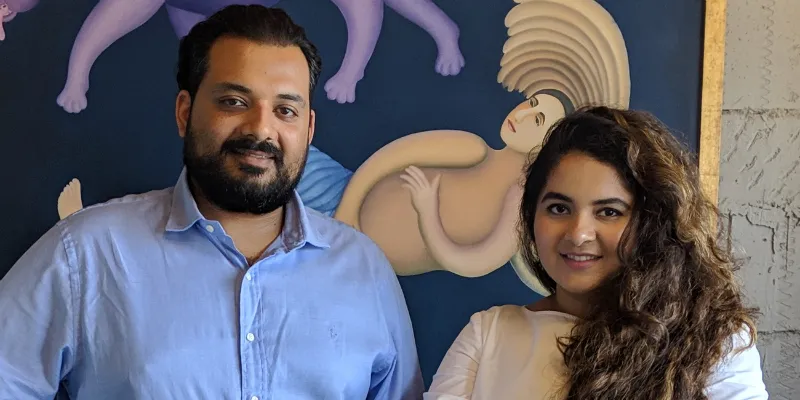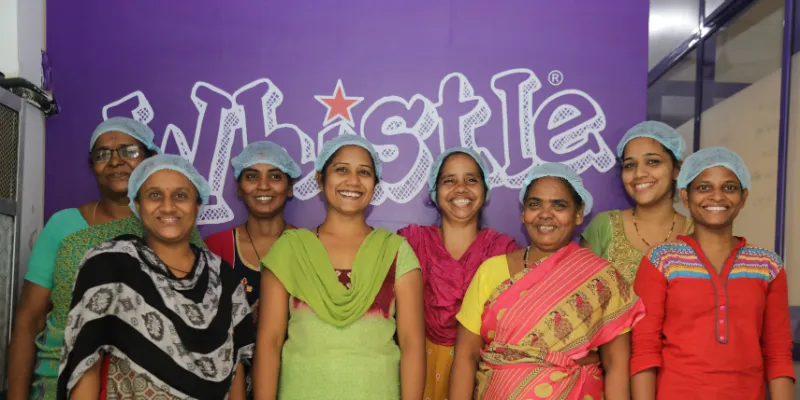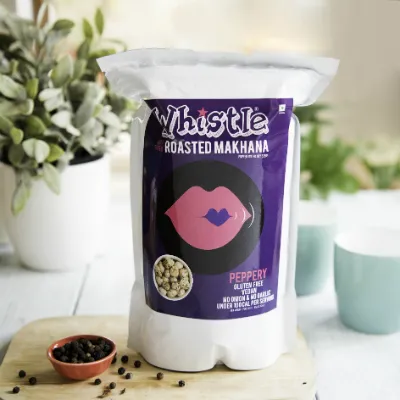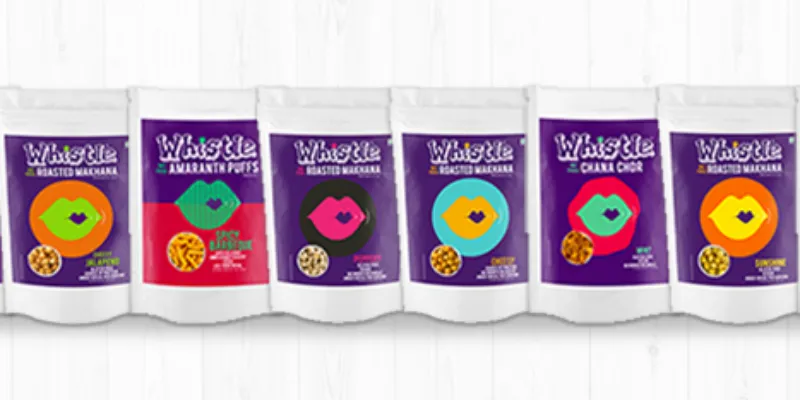Meet the all-women team of Whistle Snacks' factory who aim to deliver under-100 calorie snacks
Started by Heena Karia Thakkar, Whistle Snacks employs a team of eight women who run all operations, from processing to packaging. Whistle's products are present in over 300 stores in Mumbai and in 10 countries.
You don’t usually see a factory run completely by women. Many times, people think handling heavy machinery, large scale packaging, and complex logistical processes can only be done by men. But that is far away from the truth. There are already some all-women factories in India and their operational efficiencies often rival factories that have a mixed workforce. Whistle Snacks factory run by Heena Karia Thakkar in Chembur, Mumbai, is one such efficient, all-women factory.
Whistle is a food brand that makes low-calorie snacks from makhana, amaranth (rajgira) puffs and the traditional chana jor. Makhanas are lotus seeds which are edible after they are processed and roasted. They are highly nutritious, light, and make for a great snack.
The business was launched in 2016 and decided to give its women workers the complex task of processing the makhanas. Now, incredibly, its entire production and packaging staff comprises women only.
“I was spurred by the vision to empower women of India and enable them to make a difference to their lives so they could be financially independent,” says Heena (32), CEO and Co-Founder, Whistle Snacks (a brand under Corvus international Foods). Her business partner in the venture is her husband Mishal Thakkar (34), a third generation entrepreneur in the food industry who has extensive experience in the space.

Heena Thakkar (right) and Mishal Thakkar (left), Co-Founders, Whistle Snacks
But Heena’s zeal for entrepreneurship comes from her experience as a professional chef. Before starting up on her own, she used to manage and operate a chain of fast-food restaurants in Dubai, UAE, along with a centralised kitchen. After launching Whistle, she used this experience to develop all the recipes and flavours found in the brand’s products.
“We also decided to employ women in the factory so that we could help them educate their kids and help raise their standard of living,” she adds.
The factory setup
If you have visited a food factory, you would have seen different types of machinery, various packaging and assembly lines, and a lot of maintenance and upkeep being done. Whistle sells snacks worth around Rs 1 crore a year, and all of this is made by a team of just eight women. “We have seven women who do daily production and packaging and one woman who is the factory manager,” Heena says.
Praveena Patel, one of the seven women in the production and packing team, vouches for Heena’s desire to empower women.
“I studied till the seventh grade in Surat and came to Mumbai after my marriage. I didn’t even know Hindi, and I joined Whistle,” Praveena says. “My husband is differently-abled, so I am the primary earner of our family. It has now been two years since I joined the Whistle factory.”
Yogeshwari Ware, factory manager at Whistle Snacks, was also given a big break by Heena. Originally from a village near Aurangabad, she says that she always enjoyed cooking but wasn’t sure how to turn it into a career. “I moved to Mumbai after marriage as well. After joining Whistle as factory manager, the people in my village think of me highly,” says Yogeshwari. “They are proud that I am not only a wife and a mother but also an enterprising woman running the operations at a food factory as the right hand of the founder.”
Yogeshwari oversees the operations of Praveena’s team, which handles all the machinery for roasting of the ingredients, nitrogen flushing, as well as sealing. “In fact, all of the day-to-day upkeep and servicing of the machinery is done by these women,” Heena says. They also load and unload raw material and finished goods. According to Heena, the workers form a human assembly line and pass heavy items down to the person behind.

Whistle Snacks' all-woman team
It’s certainly no easy task to manufacture, package, and ship hundreds of snack products each day. But this team of hard-working women seems to have figured out how to be efficient and run the factory without a hitch.
Business model
As a food brand, having an all-women factory is not enough to sell your products. So, Whistle has another USP: its range of under-100-calorie snacks. “This range of low calorie snacks is a first-of-its-kind concept in the Indian snacking market,” Heena says.
“We make it easier for people to count the calories in their snacks. Give back to our community by improving lifestyles is something we are very passionate about as a company.”
But why did Heena choose to make healthy snacks? She says that it was out of sheer frustration of not finding new and healthy foods in India. “It was the same old brands doing the same old things, such as making the same flavours and products,” she says.
“Grocery stores are full of unhealthy snacks such as fried chips. It’s frustrating to find delicious and healthy food options. All kind of positive reinforcement kind of fizzles out when you’re hungry and then see a packet of potato chips.” she adds.
Standing out from the rest
Entering this saturated market of unhealthy snacks would be disadvantageous for any small startup. It would have to compete with larger players. But Heena saw this as an opportunity. She turned the disadvantage into an advantage by focusing on healthy foods made from traditional ingredients. She then decided to target millennials in an attempt to change flavour profiles and formats by popularising makhana-based snacks.

Whistle's roasted makhana snack in Peppery flavour
The business claims it is one of the few brands that has its own manufacturing setup, giving it a complete control over the quality of the ingredients, manufacturing process, and final product. Most brands producing makhanas do not manufacture the product themselves, according to Heena.
She also notes that Whistle is the only brand with a Jain range, i.e no onion and garlic. The brand also ventured into amaranth (rajgira) puffs and chana jor after realising it needs to expand its product offering or risk losing ground to competitors. "Even now, we constantly focus on R&D and are working on new product categories and new ideas to expand our range in the coming financial year,” Heena says.
The business is utilising ecommerce platforms and analytics technology to stay ahead of the curve. Besides having its own website to make sales, Whistle sells on third party websites and apps such as Amazon India, Scootsy, Bigbasket, and more.
“We have also seen the importance of analysing trends via Google analytics and ads, Amazon ads and other digital marketing through our social media platforms,” she adds. “This data helps us launch new flavours and products based on what customers are looking for.”
The way forward
As of now, Whistle products are present in more than 300 Mumbai stores. It also exports to over 10 countries. Heena hopes that Indian superfoods enter the mainstream snack market on an international level.
“Today, makhana is a global phenomenon. This will help farmers in India as the demand for this grows. We hope to continue to raise awareness about Indian-grown products and their benefits in the international market,” she says.

A few products from Whistle's snack range
But there is a downside to increased demand. Since makhanas come from the seasonal lotus, there has been an increase in prices of raw material. Heena says that there has been over a 100 percent increase in the price of the crop. “2018 was a huge learning for us in terms of understanding and predicting our demand for the year, and how we should be purchasing and storing raw materials for the year,” she adds.
Learning from this, Heena ensures the business has two or more suppliers for all raw and packing material so that it is not dependent on one supplier. If all goes according to plan, Whistle will soon enter new cities in India, grow its export business, and also expand its product range.
With a reliable team of highly-skilled women running the factory, scaling up seems achievable for Heena’s brand. She is also exploring market segmentation in order to serve a much larger audience now that Whistle’s production capacity has increased.
ALSO READ:
Trying to lose weight? Food Darzee tailors diets, delivers 4 keto meals for Rs 900 a day
Missing home food? Deccan Diaries’ traditional masalas have got you covered
Koko Boost adds twist to energy bars by using millets and moringa







